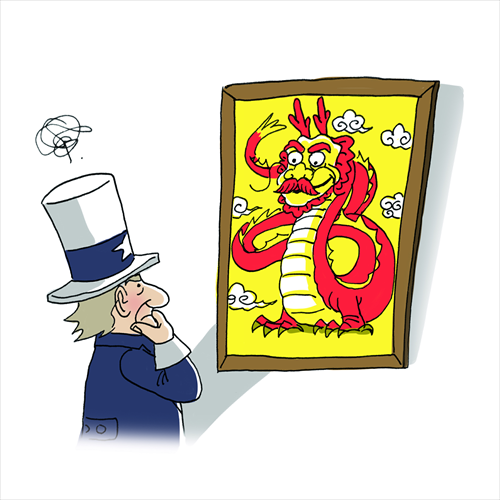HOME >> OP-ED
Common ground offers solid base for Sino-US relations
By Robert A. Manning Source:Global Times Published: 2015-6-18 20:23:01

Illustration: Liu Rui/GT
As Chinese President Xi Jinping's upcoming state visit to the US approaches, US-China relations are rife with tension. A war of words over the South China Sea seems to be drowning out the many other important elements of a complex Sino-American relationship.
Judging by the flood of articles and think-tank reports in the US, there is growing doubt about the validity of core assumptions guiding what has been a bipartisan US policy toward China under eight US presidents, from Richard Nixon to Barack Obama.
So how do we find a new equilibrium for what has become the world's most important diplomatic relationship? That is the challenge for Xi's September visit. First, building on common ground is imperative. The bilateral economic relationship, some $600 billion in two-way trade in 2014, is a pillar of US-China ties. A new understanding on regional trade arrangements is one means of broadening the relationship. Obama should explicitly invite China to join the Trans-Pacific Partnership (TPP) whenever Beijing is ready. There should be a Sino-US effort to begin a process of converging the TPP and the Regional Comprehensive Economic Partnership into a Free Trade Area of the Asia-Pacific, as APEC has sought, by 2030.
An important catalyst for such efforts would be a high-quality US-China Bilateral Investment Treaty (BIT). A BIT would give American companies better access to China's market, and equal rights as Chinese firms. A BIT would also facilitate Chinese investment into the US and create a more level playing field both for US firms in China as well as Chinese firms in the US. This is the single most important step to deepen the economic relationship.
In regard to foreign policy, the Greater Middle East, from North Africa to Pakistan, should be a centerpiece of the Xi-Obama meeting and of Sino-US cooperation. China is already playing an important role in the P5+Germany nuclear talks with Iran. Beijing is also proactive in trying to broker peace in Afghanistan, another area where US and Chinese interests overlap.
More broadly, as a major importer of Middle East oil and a large investor in the region, China has at least as large a stake as the US in trying to minimize the turmoil and conflict that engulfs the region. Creating a high-level mechanism to coordinate polices toward the region would be a good outcome for the summit.
The third element of creating a new equilibrium is a longer-term process of reaching understandings on the global commons - maritime, air, cyber and space. The visit to Washington last week of General Fan Changlong, vice-chair of the CPC Central Military Commission to further military-to-military relations was a small step forward. On maritime and air issues, implementing and expanding on agreements reached in November 2014 on confidence building are one important element. The Notification of Major Military Activities Agreement and Rules of Behavior Memorandum of Understanding are preventive measures to avoid misperceptions or unintended incidents. The Rules of Behavior create a code of conduct for ship-to-ship communication. The US would like to build on that to also cover air-to-air communication.
The big issues are cyberspace and outer space. These are vital domains, and reaching understandings are key to forging strategic stability. Both sides have had their share of transgressions. But both are dependent on cyber security for their economies and space for military operations as well. Thus, there is a mutual vulnerability that could be the impetus for accord.
These domains are relatively new global commons lacking adequate rules. So the US and China have an opportunity to shape new norms and standards that could be building blocks to global regimes. This will be a difficult process, but one that would be an important underpinning of strategic equilibrium. The Xi-Obama summit could provide new impetus for movement toward that goal. Substantive progress in each of these three areas would tip the Sino-US relationship in a more cooperative direction. They form a strong agenda for the upcoming summit.
The author is a senior fellow of the Brent Scowcroft Center for International Security at the Atlantic Council and its Strategic Foresight Initiative. opinion@globaltimes.com.cn. Follow him on Twitter at @RManning4
Posted in: Viewpoint